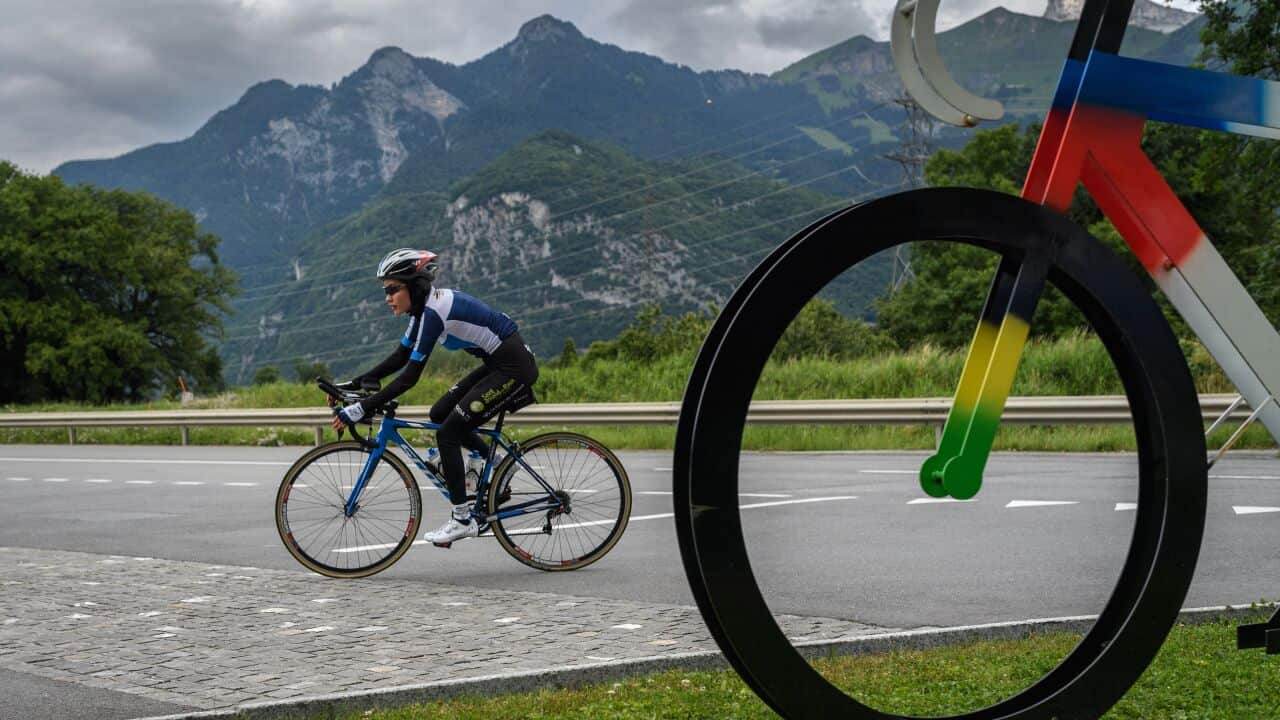On a road bike with aero bars, sporting none of the latest time trial tech and apparel, it was never going to be a case of the young rider from Afghanistan upstaging any of the big names in the time trial, but instead all about the journey to reach the Olympics through persecution and hardship.
The 25-year-old has come a long way since starting her career in cycling on the roads of Afghanistan, dodging hurled insults and stones as she attempted to pursue her cycling dreams along with a group of like-minded women supported by an enthusiastic coach.
Already sticking out as a member of Hazara minority within the Taliban-enforced conservatism of Afghanistan she had to leave her homeland to be given the opportunity to pursue her cycling goals in France.
A 2016 Arte TV documentary entitled 'Les Petites Reines de Kaboul' ('The Little Queens of Kabul') showed the all-women team training in the capital city of Afghanistan despite being assaulted and threatened by some within the country. Ali Zada was deliberately hit by a car during the filming for the documentary and there were other death threats aimed at herself, colleagues and their coach, the now-deceased Abdul Sadiq Sadiqi.
It inspired French activists to reach out and help the riders, with three riders featured in that documentary finding sanctuary in France. From there, Ali Zada qualified for the Olympics through the Refugee Olympic Team and was the first starter from the Fuji International Speedway.
"It was so, so good, my first time trial, my first Olympic Games,” said Ali Zada. “As a first experience, I'm so happy with it because I worked for it and I tried to use all the sacrifice from several months. I don't have any regrets.
"I'm so happy to represent the Refugee Olympic Team because I will send a message of hope and peace for 82 million people who are obliged to leave their country because of different reasons.
"And also I'm here to represent the rights of women in Afghanistan and for all countries like Afghanistan, where people think that women don't have rights. So I'm here for two objectives - the rights of women and also for the refugees."
Ali Zada’s significance as a female athlete from Afghanistan competing at the Olympics is a moment in history for the country, one that shows that despite all the obstacles put in her path while attempting to pursue the sport in her home country, an Afghani woman can still compete in the peak competition in the world. It’s a symbolic responsibility that Ali Zada feels keenly.
"It's my responsibility to try to work for the rights of women in Afghanistan and also for all the countries where people think that women don't have rights,” said Ali Zada, “and also to send a message of hope and peace for all the refugees around the world.
"When I started cycling, some people in Afghanistan did not agree with it because it's a new thing for the people to see a girl who rides a bike. I could understand why they don't want to accept it.
"Even here, in the hotel with the other cyclists, they look at me strangely. I think they've never seen a girl with a scarf on a bicycle. But in Afghanistan, I'm sure if they see regularly a woman on a bike, they will accept it."
The fight to be on the startline in Tokyo is not just a symbolic one, but also a personal tale of perseverance which has seen her leave her family behind in Afghanistan and create a new life in France, where she is currently studying civil engineering at university.
"My father sent me a message this morning,’ said Ali Zada. “When I was in Afghanistan, he was the only one who always supported me.
"Even when I wanted to stop, he pushed me - 'No, you have to continue, you cannot stop it, you have to continue until the end’.
"So he sent me a message this morning and said, 'Do your best'. I hope that he will be happy."
Share
Watch the FIFA World Cup 2026™, Tour de France, Tour de France Femmes, Giro d’Italia, Vuelta a España, Dakar Rally, World Athletics / ISU Championships (and more) via SBS On Demand – your free live streaming and catch-up service. Read more about Sport
Have a story or comment? Contact Us


